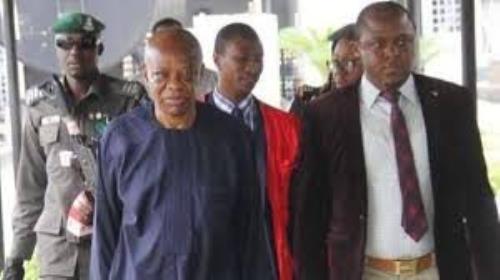•Ugorji, Echema, Imo CJ, Nnodum Harp On Peaceful Marriage
By Onyekachi Eze
History was made last week Friday, January 27, 2023, at the Owerri Ecclesiastical Province, following the maiden inauguration of the 2023 Judicial Year.
The event was packaged by the Conference of Judicial Vicars of Owerri Ecclesiastical Province, comprising Owerri Archdiocese, Umuahia Diocese, Orlu Diocese, Okigwe Diocese, Ahiara Diocese, and Aba Diocese.
The inauguration commenced with a con-celebrated Holy Mass held at the Maria Assumpta Catholic Cathedral, Owerri, with Archbishop Lucius Iwejuru Ugorji as the Chief Celebrant, together with the Bishop of Aba Diocese, Most Rev. Augustine N. Echema.
Earlier in his homily, Archbishop Ugorji described the office of Judicial Vicars as an important one, which happens to be an integral part in every Archdiocese or Dioceses, especially with their roles of uniting families and couples.
He said, since the Church is a communion of people of different tribes, the presence of Judicial Vicars across the Province is significant, which is embedded on unity of purpose.
Archbishop Ugorji opined, “The Judicial Vicars work for the restoration of Peace, the tribunal works for the interior peace of families. That is the more reason why they need the enlightenment of the Holy Spirit, in order to work as Solomon did, so as to enable them discharge their duties diligently in contentious and delicate cases”.
Afterwards, they all converged at the Jubilee Hall of the Cathedral where the official flagoff, awards presentation, and paper presentation were carried out.
In his opening remarks, the Chairman of the occasion, Hon. J.T.U Nnodum (SAN), confirmed it was first of its kind in the Owerri Ecclesiastical Province.
Commending the organizers for the vision, Nnodum disclosed that those appointed as Judicial Vicars by the Bishops are Priests of unimpared character/reputation.
He added that Character, Knowledge and Maturity are the key qualities expected of every Judicial Vicar and their tribunal officers.
Admonishing them on continuity and tenets of their duties, Hon Nnodum enjoined the Lay Faithful on regular consultation to their respective Judicial Vicars/Offices in events of troubled marriages.
The former Attorney General of Imo State continued, “The Chief Judge of the State doesn’t work alone, but works handy with the Judicial Offices too.
“As Catholics, we know the worth of our clerics. They are properly trained, not all these ones we see around. The concept of the Judicial year is to further strengthen the process and unity in Marriages, and among couples. The originality of the entire concept is wonderful”.
Delivering his welcome address, the Judicial Vicar of Orlu Diocese and Provincial Leader, Very.Rev. Fr. Dr. Donsteve C. Nnagha joyfully tagged it a milestone in the annals of the Province.
He acknowledged the vision and Episcopal discretion, tutelage of Archbishop Ugorji under whose watch it has come to be for the first time since the canonical erection of the Province in 1994.
“We are also grateful to our various suftragan Bishops who by virtue of the law are the Judges of first instance in their respective dioceses (ct. can.1419 par. 1) and with whom we as Judicial Vicars, constitute one tribunal in line with can. 1420 par.1. We owe them our sublime loyalty, obedience and hierarchical communion in the discharge of our judicial duties which are always at their discretion and moderation. Today’s occasion creates a forum of collaboration and synergy not only between the Church and the State but also a point of interaction between the ecclesiastical and secular judicial frameworks, a contact between the Civil Executive and Judicial Powers and more still, seeking for a harmonization between the common law statutes (marriage ordinance) and customary norms on marriage rites”.
“The choice of this particular topic; ‘Towards A Harmonization Of Civil And Customary Laws Effects Of Christian Marriage Amidst Marriage And Family Crisis’ is because of the challenges faced by many Christ’s faithful in the bid to fulfill the requirements of statutory laws and Native Law and Customs, and furthermore, subject themselves to the demands of the sacramentality ot Christian marriages with its firmness of unity and indissolubility (cf. can. 1055). The same person is the subject of these three forms of marriage rites with sometimes ambivalent and opposing principles. This challenge seems to be peculiar to Africans who must fulfill the Dictates of their various Constitutions, Canon Law and Customary Laws.
“The Church being the Mother and Teacher (Mater & Magister) is very solicituous of the material and spiritual well-being of her members bearing in mind that the salvation of souls is the supreme law (cf. can. 1752). Laws being “ordinances of reason as defined by St. Thomas Aquinas are for the common good. Therefore, there must be a collaborative effort between the Church and the State in search of common good (Quod omnis tangit ab omnibus approbatur). The Vatican Council Il Document “Gaudium et spes dwelt extensively on family and marriage in nos. 47-52; Its equality calls for common concern, joint action and co-responsibility between the Church and the State in seeking for answers for social questions such as marriage and family, social justice and socio-political and economic challenges (cf. GS. nos. 68 &76).
Speaking on the motif of the Conference of Judicial Vicars, Fr. Nnagha in his addressed expressed thus, “The motif for the formation of this group is to create enabling platform for collaborative judicial ministry among the various tribunals in the Province which will greatly facilitate in the prorogation of competences, personnel and resources sharing, growth of local jurisprudence and uniformity of judicial practices. It will create forum for on-going formation and education of Tribunal Personnel and transfer of cases as well as creation of access to Judicial proofs and documentations.
The conference of Judicial Vicars will promote common action and services at the provincial level while at the same time enriching our various diocesan curia activities”.
Meanwhile, the Provincial Leader called for a partnership between the Church and the State.
“Permit me a space to call for a more concerted collaboration between the Church and State especially in judicial ministry. This could be amply utilized in such areas as: Arbitration and Alternative Dispute Resolution (ADR), canonization of Civil laws, prerogative of mercy, amnesty and correctional homes services, alimony and child support, as well as other family and matrimonial issues”.
Declaring the 2023 Judicial Year open, the Host and Owerri Metropolitan Archbishop, Most Rev Lucius Iwejuru Ugorji disclosed that in a maiden meeting he held with the Judicial Vicars, he lamented on the alarming rate of breakdown of marriages.
The Archbishop maintained that while families derail, it affects the nation as it loses its fibre, young generation massively affected among other ills.
Archbishop Ugorji decried that following the aforementioned social lapses, gave rise for the maiden inauguration where the Judicial Vicars and tribunal officers would have every cause to do more work towards the unity of spouses, and peace in every household.
“To meet this need, I challenge you as you begin this legal year, to enact a more renewed pastoral- juridical strategy, and creativity that will engender effective and proactive on-going formation and preparation of our young people for marriage and family life. We have put into place a more comprehensive marriage preparation booklet for all intending couples and marriage instructors in the province. We hope that it will enthrone proper synergy and enrich marriage instructors and indeed our priests for the purpose of more formative dialogue with intending marriage couples. It should be well understood that real formation is the result of a life lived in the faith, when the love of Christ and His Church becomes connatural to a person. In this sense, it is something on-going that continues after wedding.
“In addition, as officials of our tribunal, I wish to remind you of the need to hasten the judicial processes and to be mindful of the traps of delay set by parties who make frantic efforts to prolong the process unreasonably. Hence, efforts should be made to save the judicial time of the tribunal in line with the provisions of the Code of Canon Law and Canonical-Jurisprudence (Cf. Canons 1508, 1510 Ind 1592). Once the requirements of the law are fulfilled, you are bound to order with decree, that cases proceed without undue delay. Over the years, many of the faithful are beginning to lose patience because of the slow pace of our justice system which tends to make it impossible for them to regularize their canonical status in the Church. The canonical process therefore plays an important role in the lives of the faithful who have experienced marriage crisis and, at the same time, for the harmony of relationships within the ecclesial community”.
He charged the Vicars to eschew every subjective interest while discharging their duties, and to safeguard the primary duty of impartiality characteristic of their ministry, together with all tribunal personnel and as reflection of their service to the truth.
“You are under obligation to reject any gift that may be offered to you during the cause of trial, even if it is lacking in commercial value (cf. Can. 1456).
As judges and workers in the ministry of justice and truth, all participants in the process are called to contribute to the same objective, hence they are to be treated with certain level of pastoral charity. They ought to be respected even when they tend to exhibit ignorance. The process requires careful listening to what is argued and demonstrated by the parties.
“Proper documentation and preservation of the acts of the entire process for future references are highly encouraged. Furthermore, the faithful is advised to be patient with the canonical process and not to enter into a new union “before the nullity or the dissolution of the previous one has been established lawfully and with certainty” (Can. 1085, s2). It has been discovered that many Catholic Faithful tend to disregard this norm with the sole aim of twisting the hand of the tribunal to validate an invalid union.
“Dear Judicial Vicars and Officials of the tribunal, I thank you immensely for your collaborative spirit with us your bishops in the province. I encourage you, therefore, “to continue with renewed fidelity and industriousness in your ecclesial ministry at the service of justice, inseparable from the truth and, ultimately, from the salus animarum”. (Cf. Papal Allocution, 27th January, 2022). This is the driving force of our ministry. It is the force that has its origin in God, the Eternal Love and the Absolute Truth. Truth and Charity are deeply connected. Truth is sought, found and expressed within Charity and Charity is understood, confirmed and practised in the light of truth” Archbishop Lucius Ugorji said.
In her paper presentation, the Chief Judge of Imo State, Justice Theresa Chukwuemeka Chikeka further x-rayed the relationship between the different judicial systems.
She enjoined intending couples to ensure they seal their marriage bonds in a recognised and only licensed places, warning that doing contrary would render such Marriage null and void in the sight of the Law.
Highlight of the inauguration was presentation of Awards to Archbishop Ugorji. The following Bishops; Michael Ukpong of Umuahia Diocese, Augustine Ukwuoma of Orlu Diocese, Solomon Amatu of Okigwe Diocese, Augustine Echema of Aba Diocese, and the Administrator of Ahiara Diocese also bagged awards.
Justice Theresa Chukwuemeka Chikeka was also honoured.
The closing remarks/appreciation was rendered by the LOC Chairman and Judicial Vicar of Owerri Archdiocese, Very Rev Fr. Dr. Jude Onyeakazi.
Also present in their full regalia were Judicial Vicars; Very Rev Msgr. Dr. Augustine Kalu (Umuahia Diocese), Very Rev. Fr. Dr. Michael Agbayi (Okigwe Diocese), Very Rev. Fr. Dr. Martin Elekwachi (Ahiara Diocese), Very Rev. Fr. Dr. Peter C. Nwosu (Aba Diocese).









